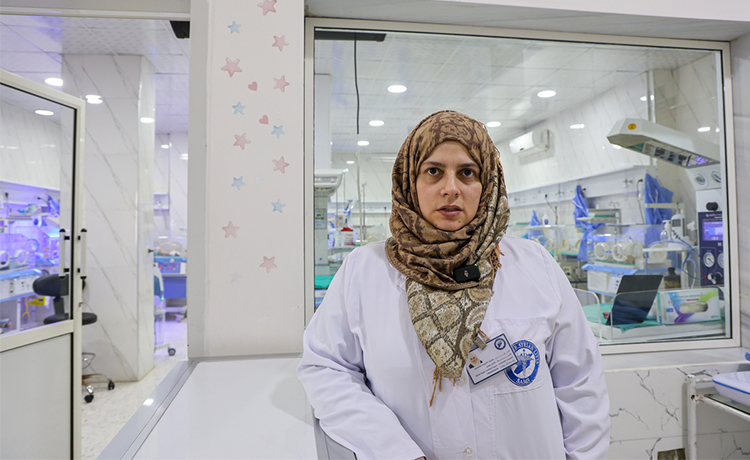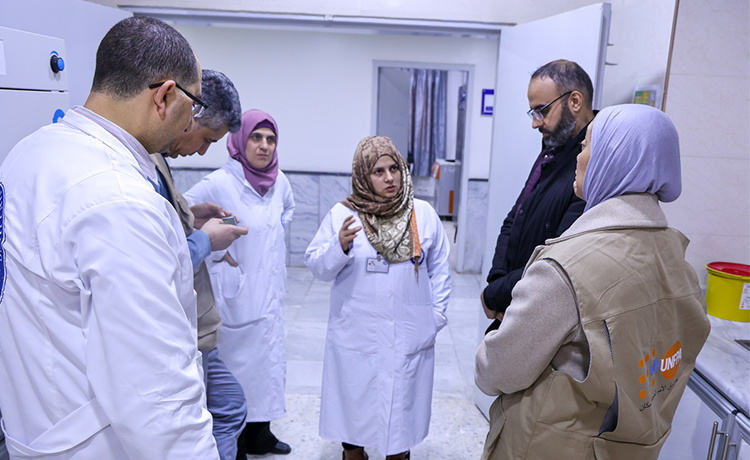News
After 13 years of crisis, we hear from female health workers in Syria leading the charge for women and girls
- 14 March 2024
News
IDLEB, Syrian Arab Republic – “I have personally experienced the dire consequences of conflict on health care,” said Dr. Ikram Habbush, director of the Idleb Maternity Hospital in northwest Syria.
Dr. Habbush is the first female obstetrician to lead the facility, which is supported by UNFPA, the United Nations sexual and reproductive health agency, and operated by the Syrian American Medical Society (SAMS). She’s also one of many resilient female health workers who have dedicated themselves to ensuring the well-being of Syria’s women and girls despite 13 years of conflict, mass displacement, earthquakes and roiling insecurity.
“My aim is to create positive change within my community, and to safeguard the lives of women and girls in one of the world's most crisis-affected regions,” she told UNFPA.
Widespread instability and severe underfunding mean that more than one in three health facilities in Syria cannot operate at full capacity. The rest are often undersupplied, overwhelmed and in many cases unable to support patients facing dire health emergencies. In northwest Syria, this has led to a tragic number of pregnant women confronting obstetric emergencies and losing their lives, many while being transferred between hospitals lacking crucial supplies such as medicine and blood.
At the maternity hospital where Dr. Habbush works, UNFPA and partners set up a blood bank that last year helped save the lives of an estimated 2,000 women. The hospital is able to support complex and high-risk deliveries, including an average of 150 births by Caesarean section per month. It also provides comprehensive care services for emergency obstetrics and care for new infants, in addition to providing integrated protection and gender-based violence services.

The vital role of female providers
Yet amid mounting security threats in northeast, southwest and central areas of Syria – and with severe funding shortfalls affecting the entire humanitarian system – many emergency obstetric and newborn care facilities have had to suspend their services.
And in northwest Syria alone, UNFPA data show that these challenges have left more than 2 million people with barely any access to critical support, and some 500,000 women and girls with only limited access to vital sexual and reproductive health services.
Into this gap have stepped Syria’s female health-care providers, who women and girls seek out for empathy and support not just during pregnancy and childbirth, but also in response to harmful practices like gender-based violence.
The trauma from such experiences can be debilitating, making psychosocial support a priority for Syria’s health-care providers to offer. Across Syria, UNFPA supports the training of midwives to ensure pregnant women, mothers and newborns are properly cared for and receive advice support for psychological issues like postnatal depression – a condition that has become increasingly prevalent as the crisis in the country grinds on.
“Women and girls in our community have a strong preference for being examined by female obstetricians rather than male ones,” explained Dr. Najwan Khizran, who works at the Idleb hospital.
Midwife Amna Marai works in Idleb’s Qah Hospital, which is supported by UNFPA and SAMS. “As a midwife with 30 years of experience, I've learned that supporting new mothers through postnatal depression is crucial,” she explained. “In addition to counselling, midwives can refer cases for psychological support and give recommendations to help them navigate this challenging phase.”

Empowering women in health care
Last year, UNFPA programmes ensured almost 1.9 million people across Syria were able to access sexual and reproductive health services and more than 880,000 received gender-based violence prevention and response support. Yet 2023 was one of the worst years for Syrian women and girls since before the pandemic – and funding shortfalls mean things are likely to get worse in 2024 as a record 16.7 million people need humanitarian assistance.
In protracted crises such as Syria, many women and girls are confronted with damaging social norms such as early and child marriage, as well as entrenched gender inequalities that force them into caretaker roles rather than prioritizing their careers or academic potential.
Despite odds stacked increasingly against the women and girls of Syria, UNFPA Regional Director for the Arab States, Leila Baker, said, “Their resilience is nothing short of extraordinary. Many have risen above their circumstances, becoming community leaders, activists, and entrepreneurs, striving for a better future for themselves and their communities.”
“Their unyielding spirit underlines the importance of not just meeting immediate needs but also investing in their long-term well-being and empowerment.”
For Dr. Habbush, the message to her fellow Syrians is to be fearless. “When driven by a cause you firmly believe in, don't for a moment doubt your capacity to effect change simply because you're a woman.”